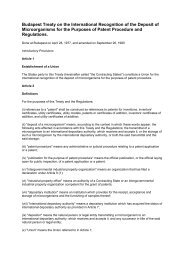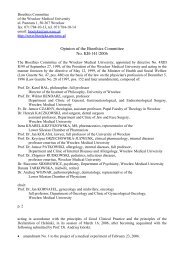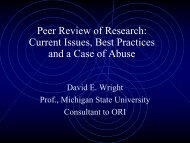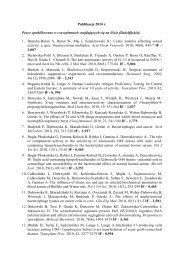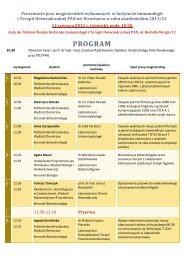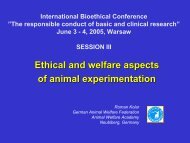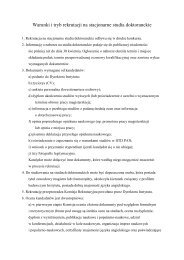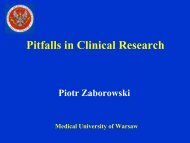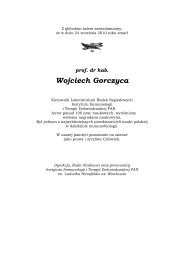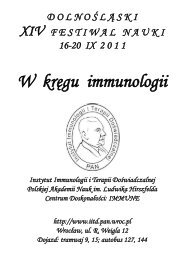Major misconduct case: Dr. Eric Poehlman, University of Vermont
Major misconduct case: Dr. Eric Poehlman, University of Vermont
Major misconduct case: Dr. Eric Poehlman, University of Vermont
Create successful ePaper yourself
Turn your PDF publications into a flip-book with our unique Google optimized e-Paper software.
<strong>Major</strong> <strong>misconduct</strong> <strong>case</strong>:<br />
<strong>Eric</strong> <strong>Poehlman</strong>, , Ph.D.<br />
<strong>University</strong> <strong>of</strong> <strong>Vermont</strong><br />
Chris B. Pascal, J.D., Director,<br />
Office <strong>of</strong> Research Integrity (ORI)<br />
ORI 4/05 1
Initial Allegations<br />
The initial allegations arose when <strong>Dr</strong>.<br />
<strong>Poehlman</strong> provided a colleague, about a<br />
week apart, two versions <strong>of</strong> a spreadsheet<br />
containing physical, dietary, energetic, and<br />
metabolic data on elderly men and women<br />
seen twice, on average, about six years<br />
apart.<br />
In the complainant’s s own words:<br />
ORI 4/05 2
Initial allegations (cont)<br />
• The incident that triggered my suspicions<br />
occurred in late September, 2000 - I was asked<br />
by <strong>Dr</strong>. <strong>Poehlman</strong> to write a paper from a<br />
longitudinal database (Protocol #678). The<br />
paper was to examine the effects <strong>of</strong> age on<br />
lipids in men and women… When I presented<br />
him with the data, he was not satisfied with the<br />
results and asked for the database in order to<br />
verify data entries and check for what he<br />
described as "reversed" datapoints, … It was my<br />
belief that I was mistakenly given a “true”<br />
version <strong>of</strong> the dataset originally and then given<br />
the manipulated version the second time…<br />
ORI 4/05 3
The Scope <strong>of</strong> the Misconduct<br />
• The following two slides provide a brief<br />
glimpse <strong>of</strong> the massive scope <strong>of</strong> <strong>Dr</strong>.<br />
<strong>Poehlman</strong>’s s alterations in the data base for<br />
the longitudinal study <strong>of</strong> aging, protocol<br />
#678.<br />
ORI 4/05 4
Correct TEE values<br />
<strong>Dr</strong>. <strong>Poehlman</strong>’s TEE values<br />
<strong>Dr</strong>. <strong>Poehlman</strong>’s changes to total<br />
energy expenditure values included<br />
many fabrications (blue) and<br />
reversals <strong>of</strong> visit one and visit two<br />
values (red)<br />
The net effects were to greatly<br />
inflate the number <strong>of</strong> subjects and<br />
to reverse the apparent effect <strong>of</strong><br />
aging.<br />
ORI 4/05 5
<strong>Dr</strong>. <strong>Poehlman</strong>’s changes to<br />
glucose involved near<br />
complete reversal <strong>of</strong> T1 and<br />
T2 values, allowing him to<br />
claim that glucose levels<br />
rose with age when the real<br />
data showed the opposite.<br />
ORI 4/05 6
Additional Issues<br />
• <strong>Dr</strong>. <strong>Poehlman</strong> claimed to have conducted a<br />
longitudinal study <strong>of</strong> the menopause transition<br />
involving 35 women seen twice six years apart.<br />
• This study was reported in a 1995 paper in the<br />
Annals <strong>of</strong> Internal Medicine and five follow-up<br />
papers as well as in many grant applications.<br />
• The study was not conducted: <strong>Dr</strong>. <strong>Poehlman</strong><br />
falsified the number <strong>of</strong> subjects at T1 and never<br />
saw the women a second time.<br />
ORI 4/05 7
The data from the Annals paper claimed to show that the<br />
menopause transition quickly leads to undesirable<br />
changes in weight, fat mass, resting metabolic rate,<br />
leisure time activity, and waist-to-hip ratio.<br />
None <strong>of</strong> these conclusions were legitimate (although<br />
cross-sectional studies have suggested that changes do<br />
occur eventually).<br />
Additional fabricated results from this study were reported<br />
in later papers and grant applications.<br />
ORI 4/05 8
Additional Issues (cont)<br />
• The UVM investigation, ORI, and the U.S.<br />
Attorney’s s <strong>of</strong>fice determined that <strong>Dr</strong>. <strong>Poehlman</strong><br />
falsified data in additional papers and grant<br />
applications in areas as wide ranging as<br />
Alzheimer’s s disease, the effect <strong>of</strong> endurance<br />
training on RMR, and the effects <strong>of</strong> hormone<br />
replacement therapy on post-menopausal<br />
women.<br />
• Many <strong>of</strong> these false claims were also made in<br />
talks given by <strong>Dr</strong>. <strong>Poehlman</strong>, some <strong>of</strong> which<br />
were documented, allowing findings <strong>of</strong> scientific<br />
<strong>misconduct</strong> to be made.<br />
ORI 4/05 9
<strong>Dr</strong>. <strong>Poehlman</strong>’s s obstruction efforts<br />
• Starting immediately after being accused <strong>of</strong><br />
<strong>misconduct</strong>, <strong>Dr</strong>. <strong>Poehlman</strong> aggressively<br />
attempted to obstruct the <strong>University</strong><br />
investigation, and subsequently the<br />
Government’s s review.<br />
• He accused his young colleagues <strong>of</strong> having<br />
falsified the 678 database.<br />
• He went to Federal court to attempt to block<br />
UVM from notifying ORI <strong>of</strong> the pending<br />
investigation.<br />
ORI 4/05 10
Obstruction (cont)<br />
• During the investigation, he solicited letters <strong>of</strong><br />
support from collaborators and former<br />
technicians who claimed that they had helped<br />
with the longitudinal menopause study; these<br />
claims resulted from <strong>Dr</strong>. <strong>Poehlman</strong>’s s false<br />
assurances and edits <strong>of</strong> the letters, and they<br />
placed these witnesses in legal jeopardy.<br />
• <strong>Dr</strong>. <strong>Poehlman</strong> submitted falsified and fabricated<br />
documents to the UVM committee in an effort to<br />
show that the 35 women in the menopause<br />
study had visited the GCRC a second time.<br />
ORI 4/05 11
Additional Findings Made by ORI in<br />
its Oversight Review Include:<br />
• <strong>Dr</strong>. <strong>Poehlman</strong> provided yet another falsified<br />
version <strong>of</strong> the Protocol 678 spreadsheet to a<br />
witness (W1) in the fall <strong>of</strong> 2000, suggesting<br />
that W1 write a review.<br />
• W1 and <strong>Dr</strong>. <strong>Poehlman</strong> then wrote a review<br />
article that included falsified results about the<br />
decline in RMR upon aging.<br />
• <strong>Dr</strong>. <strong>Poehlman</strong> also gave falsified TEE and body<br />
composition data to another witness (W2) in August<br />
2000 to provide him with data for a presentation to be<br />
given in September 2000.<br />
ORI 4/05 12
Why did it take so long to discover?<br />
• The reality is that an established and<br />
renowned principal investigator with this<br />
volume <strong>of</strong> complex data could easily<br />
generate and propagate false values for<br />
months, even years, without anyone<br />
catching on (UVM Report, p. 19)<br />
ORI 4/05 13
Summary<br />
• <strong>Dr</strong>. <strong>Poehlman</strong> falsified and fabricated data<br />
in NIH grant applications and in published<br />
articles over a 10 year period with NIH<br />
funding <strong>of</strong> almost $3 million<br />
• Counting two USDA applications, he<br />
provided falsified and fabricated<br />
preliminary data to government agencies<br />
in 17 different competitive and non-<br />
competitive applications.<br />
ORI 4/05 14
Summary<br />
• The <strong>misconduct</strong> affected studies related to<br />
disease prevention, including research on<br />
the health <strong>of</strong> older men and women, the<br />
effect <strong>of</strong> diet, exercise, menopause status,<br />
hormone replacement, and disease status<br />
ORI 4/05 15
Summary<br />
• The <strong>University</strong> <strong>of</strong> <strong>Vermont</strong> made 22<br />
findings <strong>of</strong> scientific <strong>misconduct</strong> in areas<br />
represented by 3 GCRC protocols.<br />
• ORI confirmed 21 <strong>of</strong> the findings made by<br />
UVM and made 35 additional findings in<br />
the same plus 2 additional areas ( 5<br />
protocols).<br />
ORI 4/05 16
Publications Identified for<br />
Retraction/Correction<br />
• 1. <strong>Poehlman</strong> E., Goran, M., Gardner, A., Ades, P., Arciero, P.,<br />
Katzman-Rooks, S., Montgomery, S.M., Toth, M., and Sutherland, P.,<br />
Determinants <strong>of</strong> decline in resting metabolic rate in aging females,<br />
es,<br />
American Journal <strong>of</strong> Physiology, , 264:E450-E455, E455, 1993.<br />
• 2. <strong>Poehlman</strong>, E., Toth, M., and Gardner, A., Changes in Energy Balance and<br />
body composition at menopause: a controlled longitudinal study, Annals <strong>of</strong><br />
Internal Medicine vol. 123, No. 9 (1 November): 673-675, 675, 1995.<br />
• 3. <strong>Poehlman</strong>, E., Toth, M., Ades, P., and Rosen, C., Menopause-associated<br />
associated<br />
changes in plasma lipids, insulin-like like growth factor I and blood pressure: a<br />
longitudinal study. European Journal <strong>of</strong> Clinical Investigation 27:322-326,<br />
326,<br />
1997. All pages.<br />
• 4. <strong>Poehlman</strong>, E. and Tchern<strong>of</strong>, A., Traversing the menopause: changes in<br />
energy expenditure and body composition, Coronary Artery Disease 9:799-<br />
803, 1998.<br />
• 5. Tchern<strong>of</strong>, A. and <strong>Poehlman</strong> E., Effects <strong>of</strong> the menopause transition tion on<br />
body fatness and body fat distribution, Obesity Research vol. 6, No. 3<br />
(May):246-254 254 1998. 249, 250, 251, 252.<br />
ORI 4/05 17
Published Papers<br />
• 6. Tchern<strong>of</strong>, A., <strong>Poehlman</strong>, E., and Despres, J., Body fat distribution, the<br />
menopause transition, and hormone replacement therapy. Diabetes and<br />
Metabolism 26:12-20 20 2000. 17.<br />
• 7. Rawson, E. and <strong>Poehlman</strong>, E., Resting metabolic rate and aging, , In:<br />
Recent Research Developments in Aging, Research Signpost Group, India,<br />
2000 (pp. R 1791, R 1792 and R 1804, reference 34).<br />
• 8. <strong>Poehlman</strong>, E. "Menopause, energy expenditure, and body composition,"<br />
Acta Obstet Gynecol Scand 81:603-611, 611, 2002 (pages 605, 606 and 607,<br />
608) (falsified RMR, LTPA, FM, W/H, RQ from the "longitudinal menopause<br />
study").<br />
• 9. <strong>Poehlman</strong>, E., Gardner, A., and Goran, M., Influence <strong>of</strong> Endurance<br />
training on energy intake, nor epinephrine kinetics, and metabolic rate in<br />
older individuals, Metabolism 41(September):941-948, 948, 1992<br />
• 10. <strong>Poehlman</strong>, E., Gardner, A., Arciero, P., Goran, M., and Calles, J.,<br />
Effects <strong>of</strong> endurance training on total fat oxidation in elderly persons J.<br />
Appl. Physiol. 76(6):2281-2287, 2287, 1994.<br />
ORI 4/05 18
Assurance<br />
• Assurance on application form PHS 398, #15<br />
• Principal Investigator/Program Director<br />
Assurance: I certify that the statements herein<br />
are true, complete and accurate to the best <strong>of</strong><br />
my knowledge. I am aware that any false,<br />
fictitious, or fraudulent statements or claims may<br />
subject me to criminal, civil, or administrative<br />
penalties. I agree to accept responsibility for<br />
the scientific conduct <strong>of</strong> the project and to<br />
provide the required progress reports if a grant<br />
is awarded as a result <strong>of</strong> this application.<br />
ORI 4/05 19
This is what led to <strong>Dr</strong>.<br />
<strong>Poehlman</strong> pleading<br />
guilty to a felony<br />
ORI 4/05 20
What is the involvement <strong>of</strong> the<br />
<strong>Vermont</strong> U.S. Attorney<br />
• Defended civil litigation brought by <strong>Dr</strong>.<br />
<strong>Poehlman</strong> to prevent mandatory reporting <strong>of</strong><br />
<strong>misconduct</strong> investigation to ORI<br />
• Opened civil and criminal fraud investigations<br />
into <strong>Dr</strong>. <strong>Poehlman</strong>’s research activities, assisted<br />
by ORI and HHS OIG<br />
• Decided that false claims <strong>of</strong> <strong>Dr</strong>. <strong>Poehlman</strong><br />
warranted a criminal charge and personal<br />
monetary settlement <strong>of</strong> $180,000<br />
• <strong>Dr</strong>. <strong>Poehlman</strong> still subject to possible criminal<br />
sentence<br />
ORI 4/05 21
ORI actions and the<br />
Whistleblower’s s role<br />
• ORI/ASH actions against <strong>Dr</strong>. <strong>Poehlman</strong><br />
include lifetime debarment from Federal<br />
research funding and retraction/correction<br />
<strong>of</strong> ten published papers<br />
• The whistleblower in this <strong>case</strong> later filed a<br />
qui tam suit under Federal fraud laws and<br />
received a relator’s share <strong>of</strong> 12%<br />
($22,000) <strong>of</strong> the Federal recovery <strong>of</strong><br />
$180,000<br />
ORI 4/05 22
<strong>Dr</strong>. <strong>Poehlman</strong>’s Misconduct<br />
• What is the impact on the scientific<br />
community?<br />
• What is the impact on the public?<br />
• What are some lessons learned?<br />
• What can your institution do to prevent or<br />
reduce research <strong>misconduct</strong>?<br />
ORI 4/05 23
ORI Homepage<br />
• At www.ori.hhs.gov see the original<br />
documents in this <strong>case</strong>, including the<br />
redacted UVM investigation report<br />
ORI 4/05 24
Responding to<br />
Allegations <strong>of</strong><br />
Misconduct<br />
Chris B. Pascal, J.D.<br />
Director, ORI<br />
ORI 4/05 25
Seven Steps to Success<br />
• Design a good system<br />
• Be prepared<br />
• Follow the defined process<br />
• Consult counsel<br />
ORI 4/05 26
Success (cont)<br />
• Understand the BIG<br />
PICTURE<br />
• Attend to small details<br />
• Focus on integrity, not just <strong>misconduct</strong><br />
ORI 4/05 27
Rights and Obligations<br />
<strong>of</strong> Whistleblowers and<br />
Respondents<br />
Chris B. Pascal, J.D.<br />
Director, Office <strong>of</strong> Research<br />
Integrity<br />
ORI 4/05 28
Whistleblower role as<br />
complainant<br />
• Know your facts<br />
• Know the definition <strong>of</strong> research<br />
<strong>misconduct</strong><br />
• Identify PHS jurisdiction over the<br />
allegation<br />
• Disclose to responsible <strong>of</strong>ficials<br />
• Maintain confidentiality<br />
• Protect yourself<br />
ORI 4/05 29
Whistleblower role as witness<br />
• Provide evidence<br />
• Cooperate with institution<br />
• Understand need for objectivity<br />
• Accept the outcome<br />
ORI 4/05 30
Protection from retaliation<br />
• PHS regulation states that institutions will<br />
undertake “diligent efforts to protect the<br />
positions and reputations <strong>of</strong> those persons<br />
who, in good faith, make allegations” <strong>of</strong><br />
research <strong>misconduct</strong>. 42 CFR<br />
50.103(d)(13)<br />
• Allegations which are made falsely or in<br />
reckless disregard for the truth are not in<br />
good faith<br />
ORI 4/05 31
Institutional obligations to<br />
whistleblower<br />
• Protect from retaliation<br />
• Maintain confidentiality for whistleblower<br />
• Offer opportunity for review and comment<br />
on inquiry and investigation<br />
• Do a fair, quality job on the allegation<br />
• If retaliation occurs, take serious steps to<br />
correct the situation<br />
ORI 4/05 32
ORI Whistleblower Guidelines<br />
Offers three options for institution:<br />
• Investigation by institution<br />
• Binding arbitration<br />
• Settlement<br />
• Any other process that meets regulatory<br />
requirement may also be used<br />
ORI 4/05 33
Protections for respondents<br />
• Notice <strong>of</strong> allegations<br />
• Access to evidence; opportunity to<br />
respond<br />
• Review and comment on inquiry and<br />
investigation reports<br />
• Confidentiality<br />
• Fair, objective process with appropriate<br />
expertise<br />
ORI 4/05 34
Obligations <strong>of</strong> respondent<br />
• Provide data and other evidence to<br />
institution<br />
• Cooperate with inquiry or investigation<br />
• Avoid retaliation<br />
• Protect confidentiality <strong>of</strong> whistleblower<br />
• Understand the process and protect<br />
yourself<br />
ORI 4/05 35
Exonerated respondent<br />
• Institutions must undertake “diligent<br />
efforts, as appropriate, to restore the<br />
reputation <strong>of</strong> persons alleged to have<br />
engaged in <strong>misconduct</strong> when allegations<br />
are not confirmed” 42 CFR 50.103(d)(13)<br />
• MAINTAIN CONFIDENTIALITY!<br />
ORI 4/05 36
Restore reputation<br />
• Send letters to involved parties informing<br />
them that <strong>misconduct</strong> was not found<br />
• Remove material from personnel file<br />
• Treat the exonerated respondent as a<br />
member in good standing in the academy<br />
• Other steps appropriate to the<br />
circumstances<br />
ORI 4/05 37



